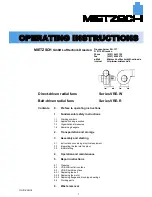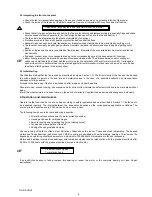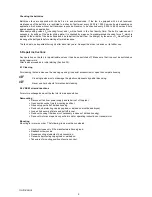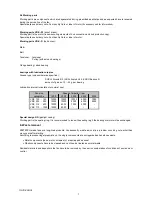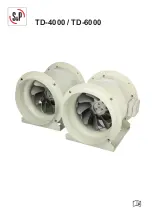
0. Preface to operating instructions
The present operating instructions are destined to make the users of fans of series VRE familiar with these devices so
that they will be able to apply them as prescribed.
The instructions contain important information for the reliable, appropriate, and economical use of these fans.
Observation of such instructions helps to avoid danger and to reduce repair cost and downtimes.
The operating instructions should permanently be available wherever the fan is applied. They have to be read and
observed by everybody responsible for transportation, assembly, starting, maintenance, and repair of the fans.
Approved technical regulations concerning workmanlike operation in consideration of safety prescriptions have to be
observed in addition to the present operating instructions and valid legal directions for the prevention of accidents.
1. Fundamental safety instructions
1.1 Warning symbols
Notes concerning economical use of the fan
Details on prescriptions and prohibitions aiming at the prevention of personal injuries and
material damages
1.2 Application as prescribed
The fans are made on the basis of the state of the art and approved safety prescriptions. Their use, however, may imply
danger to the user's life and limb and impairment of the machine and of other material values. This means that
application as prescribed and technical reliability are of utmost importance. The users have to consider and observe the
conditions specified hereinafter.
Unless otherwise specified by contractual agreements, these conditions are as detailed in the manufacturers'
prospectus valid at the making of contract.
a. Demands on the conveying medium and on vicinity
The permissible temperature range to be maintained depends on the fan type, speed rate, and material.
Chemical resistivity of applied plastics to the conveying medium has to be tested.
EX-type fans require the ignition temperature and area of explosion risk to be considered. Standard fans with EX-
type motors have no general explosion protection.
Mass density of the conveying medium has to correspond to that of pure air. The medium must not contain foreign
particles and has to be practically dustless. Higher dustiness or impure gases with the tendency to deposit can be
causes of damages.
Condensate accumulating in the housing must be able to flow out without being inhibited.
The fan must be arranged that it is free from shocks and vibrations, and it must not be subject to mechanical stress
from outside.
Check whether the fan is compatible with the environment. This refers above all to the temperature, chemical
resistivity, and explosion risk.
b. Demands on the operating mode
The speed rate, speed rates or speed ranges for fan operation must not differ from those specified by the
manufacturers.
Series connection and parallel connection of fans with forward curved vanes (e.g.VRE / 734) and operation with
higher or lower system pressure are impermissible without consultation with the manufacturers.
Unless otherwise specified, the fan must be run in the specified characteristic range only. Fans with backward
curved vanes (e.g.VRE / 731) permit operation beyond this range which, however, should be avoided for energetic
reasons.
To avoid escape of conveying medium through the shaft feedthrough, observe the condition
suction side pressure loss
1
>
total pressure loss
3
Special sealing measures should be subject to agreement with the manufacturers.
Conditions for electrical connection of the electric motor must be observed.
Speed setting and control are possible with no other fan types and control units than those permitted by the
manufacturers.
Nonobservance of the conditions specified above means violation of rules of application. The manufacturers cannot be
held responsible for damages resulting from such nonobservance.
!
!
!
2
OI-VRE 05/02

